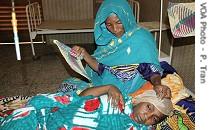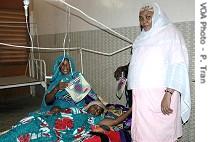-
(单词翻译:双击或拖选)
Abeche, Chad
06 June 2007
In Africa, some Muslims interpret1 Islam's teachings to mean a husband has almost total control over his wife - including her health care. Even in cases when a procedure might save a woman's life, health-care workers will often wait for a man's approval to proceed. Phuong Tran visits a hospital in the Central African country of Chad, and has this report for VOA.
 |
| Patient Halime Mahamat with mother |
The patient is recovering from a caesarian section to deliver her child.
The head of the midwife team, Fatine Maloun, says the 29-year-old patient came to the hospital with problems in the first hours of her labor4. The midwife told the patient's parents the woman needed a caesarian, but they refused.
The patient's mother said she could not decide because her daughter's husband was not at home to give permission. She adds she was not able to find any other men in the family to give permission in his absence.
Maloun says the patient came back two days later after a man gave permission for the operation. By then, the midwife says the patient had lost a lot of blood, developed an infection and a high fever.
The midwives operated, but the midwife says it was too late to save the baby.
 |
| Midwife Fatine Maloun with patient |
"When a woman comes to the hospital, first her husband must be consulted about her care," she explains. "Even if he agrees, her father must also. And her uncles. All the men have to agree. This delays the woman's care, but we have to wait."
Senegal-based sociologist5 Djiby Diakhate says Islam presents a challenge to doctors who are taught to save lives under all circumstances.
Diakhate says even though doctors take a professional vow6 to protect life, they must also obey cultural beliefs.
The sociologist says health care workers in Muslim countries must accept what many believe is taught by the Koran, Islam's religious text, that a woman is completely dependent on her husband to make all important decisions.
He says for the patient who lost her baby, the midwives could have saved the child's life, but he says they chose to follow tradition to not risk angering God.
Diakhate says Muslims prefer to follow traditions, preferring to sacrifice the life of one child rather than face widespread death and retaliation7 from an angry God and ancestors.
At the hospital, the mother of the recovering patient pulls down the mosquito net as her daughter falls asleep.
She says if she could have decided8 on her own, she would have told the midwives to operate sooner.
But she says it was not possible to make the decision.
 收听单词发音
收听单词发音
1
interpret

|
|
| vt.解释,说明,理解;vi.作口译 | |
参考例句: |
|
|
|
2
maternity

|
|
| n.母性,母道,妇产科病房;adj.孕妇的,母性的 | |
参考例句: |
|
|
|
3
ward

|
|
| n.守卫,监护,病房,行政区,由监护人或法院保护的人(尤指儿童);vt.守护,躲开 | |
参考例句: |
|
|
|
4
labor

|
|
| n.劳动,努力,工作,劳工;分娩;vi.劳动,努力,苦干;vt.详细分析;麻烦 | |
参考例句: |
|
|
|
5
sociologist

|
|
| n.研究社会学的人,社会学家 | |
参考例句: |
|
|
|
6
vow

|
|
| n.誓(言),誓约;v.起誓,立誓 | |
参考例句: |
|
|
|
7
retaliation

|
|
| n.报复,反击 | |
参考例句: |
|
|
|
8
decided

|
|
| adj.决定了的,坚决的;明显的,明确的 | |
参考例句: |
|
|
|















